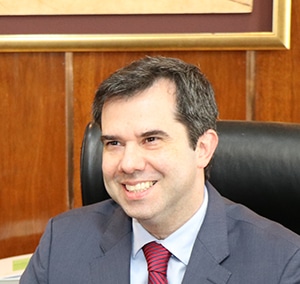José Cantero Sienra, new governor of the Central Bank of Paraguay, talks stability, reform and external shocks.

Global Finance: Paraguay has been one of the fastest-growing economies in South America, with real GDP growing by more than 4.5% annually. Recently, the central bank forecast 2019 GDP at 1.5%. Is this the end of Paraguay’s outperformance?
José Cantero Sienra: Paraguay’s biggest asset is its macroeconomic stability since an IMF deal in 2003. Our macroeconomic stability and our political stability—we are celebrating the 30th anniversary of our democracy—made economic growth possible. This growth also brought important changes; poverty, which in 2003 affected around 50% of the population, today is around 20%. Extreme poverty is under 5%.
Despite this, our economy is still very dependent on farming. And this is a bad year, with several shocks, including climatic ones. We had a bad drought, impacting 20% in soybean output and cutting 20% in energy generation [Paraguay’s largest hydroelectric plants are the Itaipu and Yacyreta dams]. These two industries have a large weight on our GDP—9% each—and this factors in with the decline of international commodity prices. Since 2015, our economy was also impacted by the slowdown in Brazil and Argentina, and we also had a flood that affected livestock. This year, the economy is impacted by all these shocks. Some are transitory, like the climatic one; others are more permanent, as the international commodity prices. However, our economy is strong and has shown its resilience. We expect to see a bounceback in 2020.
GF: What is your forecast for GDP growth in 2020?
Cantero: Our natural rate of growth is around 4% to 4.5%. Structural reforms that are under discussion will maintain and improve this natural growth rate. Next year we might have something better than that. The health of our economy guarantees solid growth.
GF: What reforms are under discussion?
Cantero: These reforms include simplification of the corporate law, which will make easier to start a business; a real estate guarantee reform, meant to widen the access to lending for small and medium-size firms; and a new bankruptcy law, which will make it easier and less expensive to shut down a business. It also includes a fiscal reform that doesn’t increase taxes—barring some higher taxes on tobacco and alcohol. We have some of the lowest tax rates in Latin America and we want to keep it that way, but we also want to simplify the process and reduce the current exceptions. This will increase the fiscal revenue, while reducing the number of loopholes. Current expenditures will also be reduced in order to improve spending and to boost available resources for improving human and physical capital.
All these reforms will allow our country to keep growing, even if the surroundings are more volatile. We have infrastructure requiring more investments. This year, public investment in infrastructure reached a total of $1.2 billion. It included components of the Bioceanic Corridor, with a new bridge, more motorways and a broadband connection with neighboring countries. We are also working on improvements at the airport. Most of all these projects are ongoing.
GF: How important is for the country to keep attracting investments?
Cantero: Paraguay is very attractive for investment because our corporate tax is 10%, our personal income tax is 10% and our Value-Added Tax is also 10%. We are a very simple country, and we are convenient for our taxes, energy and labor costs. We have very good conditions to attract investments.
GF: What about the banking system?
Cantero: The banking system is solvent, with a Tier 2 [capital ratio] of 18%, delinquency levels around 3%, lending portfolios growing around 18% and a ROE [return on equity] of around 20%.
GF: What are the main challenges in Paraguay?
Cantero: The main challenge is to maintain the macroeconomic stability, and next year we might focus on pension reform. This will increase our economic stability over time. We are also fighting organized crime, with important results. In Latin America, there are two viruses that damage the social fabric—macroeconomic instability and organized crime. Paraguay is immune to the first, and is on its way to becoming immune to the second.



